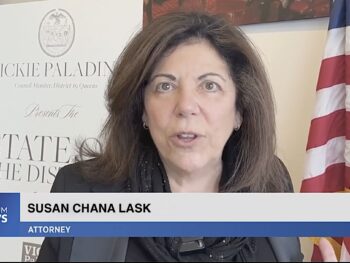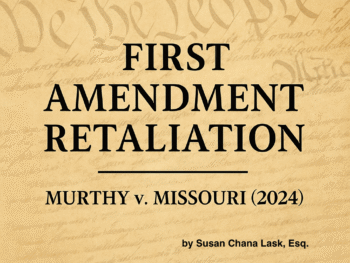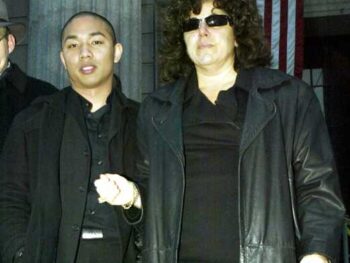The New York Times
September 30, 2004 Thursday
Late Edition – Final
SECTION: Section B; Column 3; Metropolitan Desk; Pg. 8
Choice of Losing Custody of Child or Returning to New York
BYLINE: By LESLIE EATON
When Janice Vega describes the trajectory of her life, it starts out as one of those scrappy, boot-strappy kind of stories, followed by a nearly fairy-tale twist.
There is the childhood in the tough terrain of Brownsville, Brooklyn. The career as an emer-gency medical technician (she responded to both terrorist attacks on the World Trade Center). The daughter she had out of wedlock after a brief relationship that ended before she discovered she was pregnant.
And then, three years ago, a new life as a married stay-at-home mom in a Virginia suburb where her daughter can have private schooling, ice-skating lessons, a birthday party with a clown. ”It’s the life every parent would want for their child,” Ms. Vega said.
But not every fairy tale has a happy ending. Ms. Vega, 42, has been embroiled for five years in a custody-related battle with her daughter’s father, Jeffrey Pollack. Last month, a Family Court in Queens ordered her to return to New York and enroll her daughter in first grade here, or lose custody of the child.
In a move that is being repeated in courtrooms across the country, Ms. Vega is appealing that order, in part on constitutional grounds, said her lawyer, Susan Chana Lask.
Mr. Pollack’s lawyer, Alan S. Cabelly, said neither he nor his client could comment on the case until after it is concluded. ”We’re in the middle of a trial,” he said.
Ms. Vega said she was barred from discussing her case directly, although she was willing to talk to a reporter about her life on the condition that the names of her 6-year-old daughter and her new husband not appear in print.
Her lawyer, Ms. Lask, said the Family Court referee’s decision infringed on Ms. Vega’s right to travel and to marry, as well as her right to due process, meaning a full and fair hearing. ”Relocation cases are always going to touch on constitutional rights,” she said, ”not just of the child but of the parents.”
That is because relocation custody cases pit the right of a parent with custody (still usually the mother) to move, against the right of the noncustodial parent (usually the father) to have real access to the child.
In a case now before the Colorado Supreme Court, an unmarried mother is arguing that a lower court violated her constitutional rights by requiring her to live in a designated area between Denver and Boulder, according to Anne Whalen Gill, the woman’s appellate lawyer.
In New York, courts have historically rejected constitutional arguments about the right to travel, said Barbara E. Handschu, the incoming president of the American Academy of Matrimonial Lawyers. ”Certainly you have the right to travel — but not with the child,” she said.
Still, she added, each case has to be weighed by the court. The best interest of the child is al-ways to be paramount.
Like all custody cases, this one is complex, and Mr. Pollack’s view of things is bound to be very different from Ms. Vega’s. As she tells it, she and Mr. Pollack met over the Internet and began a romantic relationship. They never lived together, she said, and split up after nine months.
A month later, she discovered she was pregnant. She said she called Mr. Pollack and said, ”If you want to co-parent, we’ll co-parent, but I’m not terminating this.”
Ms. Lask said that Mr. Pollack had paid child support, and that Ms. Vega had complied with all the court orders about visiting. Mr. Pollack, who is single and in his late 40’s, is a bill collector for Time Warner Cable in Queens, where he lives.
Less than a year after her daughter was born, Ms. Vega and the baby met a friendly man in Central Park, she said, and they began talking about their children. A few months later, they began dating, and in late 2000, they married.
By that time, the court had given Ms. Vega custody with the consent of Mr. Pollack. He has since asked that custody be changed. The court referee, Amy Rood, contends that Ms. Vega misled her and Mr. Pollack by not disclosing her plans to marry.
”It is important to recognize that when Ms. Vega was granted custody upon consent, that there was no mention of her plan in a matter of weeks to leave New York City and uproot the child,” said David Bookstaver, a spokesman for the court system.
Ms. Lask, who was not Ms. Vega’s lawyer at the time, said Mr. Pollack was well aware of Ms. Vega’s new relationship at the time.
Ms. Vega herself says she did not move to Virginia until after 9/11. She was frantic that day because she was unable to reach her husband, who works in Washington. ”I was completely over-whelmed,” she recalled.
The court gave Ms. Vega permission to take her daughter to Virginia for extensive stays, as long as Mr. Pollack’s visits were not disrupted or diminished, Ms. Lask said.
Though the schedule has varied over the last three years, she said, Ms. Vega has brought the little girl to New York every other weekend. Mr. Pollack, Ms. Lask said, has never visited the child in Virginia, despite Ms. Vega’s invitations.
The court referee ruled that the traveling was taking too big a toll on the child, tiring her out and interfering with Mr. Pollack’s visits. Thus, the order to return to New York.
So Ms. Vega finds herself living not far from the Brownsville neighborhood where she started life.
She is sleeping on a couch in her mother’s apartment. Her daughter is staying in what used to be the dining room, which Ms. Vega has decorated with new white furniture and a rug in the child’s favorite color, purple.
Still, it is not the same as the home she has had for half her life, Ms. Vega said: ”She even says it smells different. There it is so green.”
GRAPHIC: Photo: Janice Vega, left, in her mother’s apartment in Brooklyn, with her lawyer, Susan Chana Lask. They have appealed the court’s ruling. (Photo by Robert Stolarik for The New York Times)









